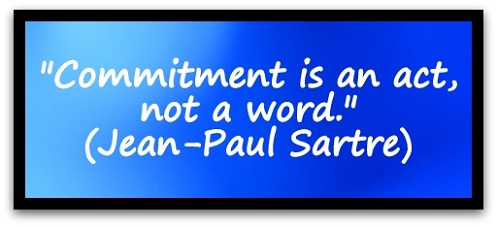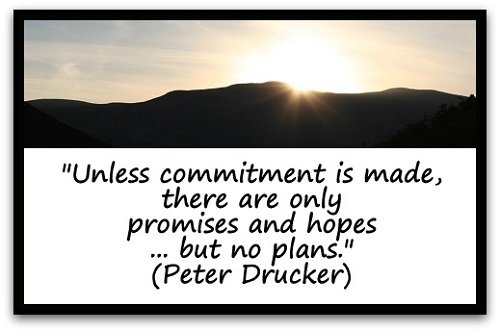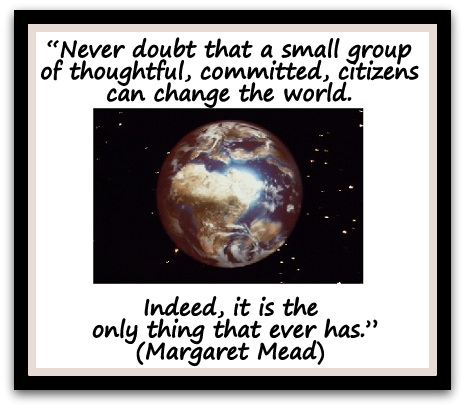Coaching Quote of the Day 2nd October 2014

“Commitment is an act, not a word.”
(Jean-Paul Sartre)

“Commitment is an act, not a word.”
(Jean-Paul Sartre)
In the first guest post of this year coach Charlotta Hughes uses her experience and knowledge to focus upon:

by Charlotta Hughes
Of course there’s no surprise that people tend to start out the New Year hoping that this will be the year when those changes will really happen. They’ll lose the weight, land the perfect job, develop a great social life, find their life partner or leave the one who isn’t making them happy.
The list goes on and I’m sure you agree that for us coaches, there’s lots of opportunities to help clients change their lives for the better around this time of year. They have the motivation, will and determination to invest in themselves and their lives.
Yet, despite this surge of energy and optimism, so often people soon lose sight of their goals and ambitions. They get busy with their day to day lives, old habits kick back in and once again their comfort zone is keeping them prisoners of the same reality they’ve been experiencing, probably for quite some time.
Having a life coach can, of course, make a huge difference. However, for many it turns out not to be enough. What started out as an exciting journey for the coachee and rewarding and energising work for the coach, then turns into a disappointing and frustrating experience for both of a ‘stuck’ client.
So why does this happen, when the person seemingly really wants the changes they set out to achieve? The problem might very well lie with the goal, not with the dedication or ability of the client. In my coach mentoring I help coaches decipher whether their goal setting actually empowers the client enough to make the desired changes their new reality. Frequently I help them see how the main tool used in goal setting today isn’t enough. Namely, the acronym SMART (Specific, Measurable, Achievable, Realistic, Timely).
I totally agree that the rules applied here are sound, however, SMART only deals with the goals. Not the person who’s going to achieve them. This is where RACE comes in. RACE is to the person, what SMART is to the goal. Here’s what it stands for:
Responsibility – this is about the fact that unless a client takes full responsibility for their own goals and dreams, they will never reach them. That ownership is pivotal! People tend to blame others or the circumstances they’re in for their own failings – it’s only by taking complete responsibility that they are in control of reaching their goals. Similarly, people often put their own happiness and ambitions in the hands of others. If a client’s dream or target involves someone loving them more or someone saying sorry to them, they are really setting themselves up for failure. They are in no way in control of this happening and they therefore can’t take responsibility for it or make it happen.
Action – people tend to plan, analyse, discuss and make decisions on how they’ll improve things and what they’ll achieve in their minds and with those around them. In the process of doing so, they can almost feel like they actually are moving closer to their goals. However, it’s only when they take actual action and DO something that they start moving towards them. Many little things will add up to the big stuff – get clients to focus on at least taking one small action in the right direction every day.
Commitment – if they aren’t dedicated and committed to achieving their dreams they’ll quickly lose sight of them. Ultimately, growing as people and instilling positive change in their lives will involve some degree of discomfort. After all, it has to involve them pushing themselves out of their comfort zones. To stick with it when the going gets tough (maybe when the ice cream craving sets in, when the unknown feels scary, when letting go of control is daunting, and so on …), they must be completely committed to themselves and they own goals. Wanting something isn’t enough, they must be 100% dedicated to accomplish it!
Emotional – clients must be emotionally attached to their dreams and goals. This is so pivotal for personal success as if they don’t care sufficiently about them to stick with them when distractions or challenges come along, they’ll be long gone by the time February arrives! They must be perceived as friends. This is also why it’s vital that the motivation for their goals comes from themselves in the first place – if they are developed for the benefit of someone else, such as to please their partner, boss or parent, they won’t have this important emotional connection to them. The goals may sound great in theory but they could soon feel more of an enemy than a friend, and that’s never going to work!
I hope you have lots of exciting work coming your way this month, and when it does, make sure these four ingredients are in the mix when establishing your clients’ goals, and once you, and they, are confident that they are, set them off to RACE towards their dreams!
 Charlotta has been coaching professionally for over 12 years and in March 2013 she won Life Coach of the Year, awarded by the national body Association of Professional Coaches, Trainers and Consultants.
Charlotta has been coaching professionally for over 12 years and in March 2013 she won Life Coach of the Year, awarded by the national body Association of Professional Coaches, Trainers and Consultants.
Her background is within Human Resources and she started her busy coaching practice, be me life coaching, in January 2007.
Charlotta specialises in coach mentoring, confidence, direction and entrepreneur coaching.
Her academic qualifications include professional Life and Corporate Coaching qualifications. She also has a BSc (hons) in Psychology & Computing, an MA in Human Resources Management and she is a Member of the Chartered Institute of Personnel and Development.
ch*******@**************ng.com
+44 (0)7720 839773
www.facebook.com/bemelifecoaching.com
 “Unless commitment is made, there are only promises and hopes … but no plans.” (Peter Drucker)
“Unless commitment is made, there are only promises and hopes … but no plans.” (Peter Drucker)

“Never doubt that a small group of thoughtful, committed, citizens can change the world. Indeed, it is the only thing that ever has.”
(Margaret Mead)
“Commitment leads to action. Action brings your dream closer.”
(Marcia Wieder)
In today’s guest post Andrew A. Faccone draws upon his own life experiences and his coaching expertise to share 3 points around life, commitment and time.
[pinit float=”right”]

“Life is like riding a bicycle. To keep your balance you must keep moving.”
(Albert Einstein)
We are all given 24 hours a day, 1,440 minutes per day and 86,400 seconds per day to use how we see fit.
Those of us reading this post are very fortunate and blessed to choose how we are to use that precious time we are given. That allotted time has a short life span, it must be used immediately and it cannot be carried over. If it is not used properly it expires.
It is our choice to maximize or minimize how we allocate our days, weeks, months and years that we are given in our lifetime. The mystery of life reveals that life is not a straight line, there is no instruction booklet on how to live and we are responsible for our actions.
The attention that we pay to the little things throughout life has a dramatic effect on the outcomes of our life as we progress and mature throughout our lifetime. Since our birth we have all pursued different paths, we have learned, prospered, been knocked down and despite the challenging conditions have succeeded as well as failed in some of our endeavors. The challenges have made us stronger and the shortcomings have taught us what not to repeat in the future. In some cases we are all learning from those shortcomings.
Past events somehow always re-appear at various times throughout our lives. In the time of our youth we pursued our education and the playful desires of our youth. Academics, athletics, music, literature, sciences, religious education, play time with our childhood friends, youth and civic groups, participation with a strong supervision from our families who attended those important life events. They cheered us on in victory and comforted us when the results did not materialize as hoped for.
When our formal education ended we then used our educational backgrounds or God given talents to find a way to make a go of it on our own. Welcome to being a grown up! We now face the commitments of professional life, parenthood, earning a living, providing for our families, advancing our professional careers and now we have become those attendees routing for our family members as they progress through their childhood and young adult activities that we participated in in the not so distant past.
Where is the person who wanted to change the world and make the difference in the world?
Is this life still a life in balance? Is there equal push and pull in our daily activities? Finding that balance, the constant struggle that addresses all of the aspects of our lives. Spirituality, physicality, and mentality.
I am asked many times in all of my personal & professional travels how did I get where I am in life? I have some of the answers to this question and some answers I do not have. I have been blessed to have had some extraordinary people that have been a part of my life. Nine years of a disciplined Catholic school education, athletic participation in high school and college, a loving family along with several key family members who taught me about the true lessons of life and that I can do anything that I set myself to attaining.
I try to rely on 3 key points and try to use them as my daily guide as I try to find a balance between the many commitments I am involved with in my daily life both personally and professionally.
What you say will determine what you will become. I have always been a believer in word affirmations. The words you are projecting will impact your individual outcomes. If you’re not projecting positive words and expecting great things to occur, they will not happen. If you don’t believe something will happen nobody else will. Use those empowering words to get you to where you want to be.
Life is an attitude -have a good one and you will enjoy the wonderful journey. When you start to make these new adjustments in your daily activities, changes in those daily habits, week after week, month after month, and year after year you will start to recognize that new person in the mirror who you have not seen in some time. Start small but think big, because you can do it, great things are coming your way… it all depends on you!
Andrew Faccone, MBA is employed in the healthcare industry as a long term care account specialists in the United States near the New York Metropolitan area. Andrew has over 18 years experience as an athlete,& coach positively impacting the lives of athletes he has coached. Andrew is available for speaking engagements of any size or location and individual coaching sessions.
Contact Andrew A. Faccone at aa****@***oo.com or
Linkedin : http://www.linkedin.com/pub/andrew-a-faccone-mba/24/291/3b2
Cell Phone 732 614 8425 Eastern Time Zone
Background on Image above title via: FreeDigitalPhotos.net
This is the second of two coaching posts with some pointers if you get “stuck” motivating a client.
Last week’s coaching post “Coaching and motivating clients, part one” talked about who was asking about motivation, asked what motivation means and assisting your client to tap into their natural desire.
Often as a coach, when the question of motivation comes up, you are looking for your client to take some action. Aid that physical movement by adding a sense of “movement” and momentum in the language you use in your conversation and questions.
My high school English teacher would no doubt shake his head in despair at the following but this is not a post designed to give linguistic labels and detailed explanations.
This section is not only here to get you to move once, it’s here to get you moving.
Adding “ing” to a word often gives a greater sense of movement and momentum so can assist your client to find answers and actions that will help them to turn that momentum into reality.
For example, you can get different answers and responses to using the word “motivated” compared to “motivating.”
Inviting your client to make a commitment and the accountability that this brings can make it much easier for a client to complete a task. You may even argue that it can make it less easy for them to put it off until tomorrow and it never getting done.
Sure, depending on your client, they may still put it off to the last minute and only do it in the immediate hours before your next session but that is still likely to be more than they had done before.
Personally I like to invite clients to agree a specific time and drop me an email between sessions to confirm that they have taken that action. It has been known for specific clients to request that if I don’t hear from them to chase them up with my own email.
I’m aware that not every coach will be willing to offer that as an option. This works for me because of the way I structure my coaching practice as I have built in priority email contact for clients in my coaching packages.
I’m also comfortable providing that accountability as I always phrase it as an invitation, giving the option for the client to decline. This means that the extra accountability is the clients by their own choice.
Sometimes, some clients will get so caught up in wanting to explore the why and thinking there is something deeply wrong with them. In reality all that has happened is that they haven’t made taking that action a priority. They have done something else in the time that they could have done this action.
Now there may, or may not, have been good reason to have prioritised something else instead. Regardless of the “cause” the reality is still the same the action/task is still to be completed.
Question for the coach: What would have to happen to make completing this a priority for this client?
Sometimes a really effective strategy can be to get the client to complete a task right then and there. This will obviously depend upon the client, the situation and what they wanted to get from the session.
For example, if they wanted to get motivation to make an appointment they had been putting off, invite them to make the call during the session.
You may not think of this as “traditional” coaching but it moves the client forward quickly and your client will not be concerned that you assisted them using something that isn’t likely to be in “coaching 101”.
This doesn’t mean overwhelm them with action steps as this can lead to them stopping again. It does mean that you can use “homework” to assist your client to get momentum going by taking the next step once they have started.
Some clients will find taking a huge leap easier than just a small step so consider this when choosing/discussing homework, if any, for your client.
Questions to consider: “What is a really easy next step to take?”
“What would be a fun next step to take?”
If you have a client who has committed to take action, you’ve done everything you can think of to facilitate that and yet they repeatedly have not taken that action, there is probably something else going on. Don’t be afraid to share what you have observed.
Your role is there to assist them to get value from your work together however it’s a two way relationship, they can’t just be passive. For some clients, in some instances, challenging your client can provide the avenue that your client needs to share what is going on for them.
Sometimes it can reveal an obstacle that for some reason your client hasn’t shared with you.
On other occasions (usually in situations when they are not paying for the coaching themselves) they may not see the value of coaching. For example, in a business when they have been told they “have” to attend your coaching session. This can give you the opportunity to have a conversation about the value they want to get and explore how you can go about providing that.
I’m also going to mention at this stage that I personally believe that not every single client is going to be a perfect fit for every single coach – and vica-versa. Also sometimes coaching may not be the ideal solution for a particular client at a particular time.
If you and your client decide that you’ve gone as far as you can with your coaching together that does not automatically mean that you are a terrible coach and should beat yourself up about it. Just like I’d say that there it does not mean that there is anything “wrong” with your client. I suggest you learn what you can from working together and then move on.
These are just some of the things you could do and consider – what else would you add?
About the Author
 Jen Waller is on a mission to support, nurture and encourage coaching skills and talents from non-coach to coach and beyond.
Jen Waller is on a mission to support, nurture and encourage coaching skills and talents from non-coach to coach and beyond.
She has created a free 7 day e-course about how to create your own unique coaching welcome pack that works for you and your clients. Get your copy here.
This was originally written in 2011, published in the weekly Coaching Confidence email update.
I walked into a room recently where the TV was playing in the background. On the screen was a picture of a man climbing out of a 5th story window. Wearing climbing gear he was attached safely to a harness and rope. He was obviously nervous about taking those first steps and had an expert beside him to support him climb up the outside of the building.
Immediately after he had successfully leaned out and trusted the rope he made a comment that had me reaching for a pen and paper.
What was this comment? “It’s the moment of commitment that makes all the difference.” Something that in my experience is true not just in climbing and abseiling.
Perhaps you have seen it in your own coaching clients as well as yourself – that moment of commitment to a goal, project or dream. I know I have.
While there are several things and reasons that can get in the way of someone progressing with what they want, the act of commitment towards that can make a huge difference to how any other obstacles are tackled.
There is a quote, often miss-accredited to Johann Wolfgang Von Goethe, that sums up the impact that commitment can make:
“Until one is committed, there is hesitancy, the chance to draw back, always ineffectiveness. Concerning all acts of initiative (and creation), there is one elementary truth the ignorance of which kills countless ideas and splendid plans: that the moment one definitely commits oneself, the providence moves too. A whole stream of events issues from the decision, raising in one’s favour all manner of unforeseen incidents, meetings and material assistance, which no man could have dreamt would have come his way.” (William H Murray)
Personally, I am currently committed to creating a specific training program. It’s something that I first had an idea for 2 years ago yet it was only when I made that commitment to turn all those many ideas into reality that it has begun to seriously take form.
This week I invite you to make a commitment to something that you want, either connected to you personal life or as a coach. If it will aid you to confirm that commitment feel free to share that with me by commenting below.
I am also prepared to offer complimentary From Non-coach to Coach Discovery sessions. I can only offer as many of these sessions as my schedule allows so these will be assigned on a first requested basis.
From Non-coach to Coach Discovery sessions are designed for individuals at the beginning of their coaching journey, if you are wanting to make a commitment to becoming a coach or starting your own coaching business then click here to find out more and to schedule your session before they all go.
Love
Jen
PS The link to book a complimentary From Non-Coach to Coach Discovery session is here